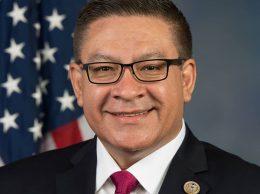Op/ed: What’s ‘right’ and what’s ‘left’ in national political scene
By Noah Smith
In physics, there’s a cool concept called “parity symmetry.” It means that there’s no way to tell right from left, other than the difference between the two. If you were speaking to someone from another planet over the phone, you couldn’t tell them which was right and which was left. “Right” is simply defined as “not left,” and vice versa.
Sometimes I feel like it has become similarly difficult to distinguish between right and left in the American political landscape.
There’s no question that the Democrats and Republicans hate each other. Bloomberg View’s Cass Sunstein reports on research showing that “partyism” is now an even deeper social division in American society than racism. Political commentator Jonathan Chait thinks that’s just fine: He wouldn’t want his child to marry a Republican.
Republicans and Democrats also seem to live in different realities. Many Republicans take it as a given that voter fraud is a big deal and voter suppression is unimportant, while most Democrats think the exact opposite. Democrats are unlikely even to know what “Benghazi” is, while to Republicans it’s a huge scandal. Etc.
For all the demonization, though, it’s not clear what Democrats and Republicans actually intend to do differently when they get in power.
Republicans want to repeal Obamacare, and decry it as a huge threat to the nation, but their own plans look pretty similar. Republicans almost caused the U.S. to default over the issue of government debt, but Obama has eliminated the deficits he initiated as part of the 2009 stimulus.
On other big issues like immigration and foreign policy, there is a lot of name-calling on both sides, but little daylight between the actual policy programs. When Republicans controlled both branches of government during the early days of the Bush administration, we got big tax cuts, but also a big expansion in government-funded health care — hardly the right- wing revolution that Democrats feared.
So now we have a fully Republican Congress. In 2016 we may get a Republican president. What will we get in terms of real policy changes? I have a wish list.
For one thing, the Republican Party could lower our corporate tax rate. We have the highest rate in the world, but this doesn’t actually net our government any more money — it just forces companies to waste their cash finding ways around the taxes.
Every economist and her dog knows that corporate tax is far less efficient than income or property tax. So will the Republican Party cut the corporate tax, say to 20 percent? So far it hasn’t exactly been a cause to celebrate for the Republicans.
How about high-skilled immigration? Whenever I bring up this issue, people insist that the Republicans want to let in more skilled immigrants, and it’s congressional Democrats who are blocking them. Well, congressional Democrats just got the boot.
Do we get action now? There’s been slight movement, but it seems to be a much lower priority than grandstanding about Obamacare or Benghazi or whatever.
Then there is trade. The Trans-Pacific Partnership deal would strengthen both our economy and our relations with Asian nations. But even though free trade is typically thought of as a big Republican issue, the Republicans seem reluctant to do anything that might boost the economy while Obama is in office.
One big argument for democracy is the idea that a “loyal opposition” can keep the dominant faction honest. But what if the opposition instead simply tries to sabotage the economy in an eternal effort to make the electorate hate the other guy more? That doesn’t bode well for our system of government.
In the past two decades, we’ve seen a lot of Republican grandstanding: the Clinton impeachment, the government shutdown, the debt ceiling debacle, and the repeated pretend attempts to repeal Obamacare.
It would be nice if we could see the new Republican Congress consign this approach to the dustbin of history, and do something useful.
In physics, it turns out that parity symmetry doesn’t quite hold — there is actually a way, however subtle, to tell right from left. Let’s hope that the same proves true of U.S. politics.
• Noah Smith writes for Bloomberg View. The ideas expressed are his own. Reach him at [email protected].












